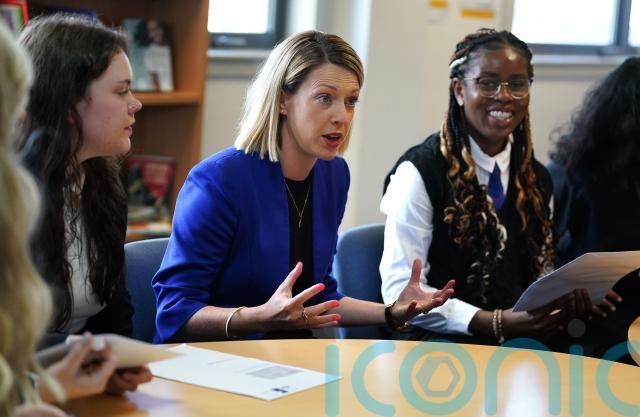
Scotland’s schools are dealing with a “rising tide of disruptive behaviour, aggression and violence”, ministers have been told.
The message was delivered as a major new study revealed more than one in 10 staff have had to deal with physical violence from a pupil towards them or another classroom worker in the last week.
The Behaviour In Scottish Schools Research (BISSR) found that just over a third of staff had experienced general verbal abuse from students in the past seven days, while 16% had had to deal with physical aggression, and 11% saw physical violence towards themselves or other staff.
In addition, two-thirds (67%) of the teachers and school support workers surveyed said they had encountered general verbal abuse between pupils within the past week, while 59% had dealt with physical aggression between students and 43% had experienced physical violence between pupils in the classroom in the last week.
Education Secretary Jenny Gilruth, who has already held summits on classroom violence, said she will set out plans to Holyrood on Wednesday on how the Scottish Government will work with councils and others to try to “tackle instances of poor behaviour at the root as soon as possible”.
Ms Gilruth added that she will “engage directly with young people on this matter to ensure their voices are front and centre” as well as working with teachers and school staff “to ensure they are fully supported in responding to these challenges”.
She made the commitment as the latest report found that “whilst the majority of staff in 2023 still perceived that all or most pupils are generally well-behaved around the school and in the classroom, perceptions of this among teachers and support staff have declined” since the previous BISSR study in 2016 and since the research began in 2006.
The report, produced by the Scottish Centre for Social Research for the Scottish Government, said there have been reported increases in what were described as “classroom disengagement behaviours and low level disruptive behaviours” since 2016 – “particularly pupils persistently infringing rules, making cheeky or impertinent remarks, engaging in general rowdiness, mucking about and deliberately excluding others”.

It also noted: “Reports of pupils being under the influence of drugs or alcohol and using digital technology/mobile phones abusively have also risen since 2016.”
Staff and teachers from 525 schools across Scotland were involved in the research, with almost a quarter (24%) reporting abuse from pupils to fellow students with additional support needs within the past week.
Meanwhile, 18% said they had encountered sexist abuse or harassment and homophobic, biphobic or transphobic abuse towards other pupils in the last seven days, with 17% having dealt with racist abuse towards other pupils in the same time frame.
Andrea Bradley, general secretary of the EIS teaching union, said the data confirmed the results of a survey it published last week which “identified a significant rise in incidents of violence and aggression in our schools over the past few years”.
The evidence from our Violence and Aggression Branch Survey reveals that violence and aggression is a serious and growing problem in schools across Scotland. #SU4QE
Find out more:https://t.co/L9MYwIZpAm https://t.co/ybNhX5RIkD pic.twitter.com/SD90CrL8st
— EIS (@EISUnion) November 27, 2023
“The results make worrying reading for everyone involved in Scottish education, with 99% of EIS branches indicating that poor pupil behaviour, including violence and the threat of violence, is having a detrimental impact on the learning experience of pupils in our schools,” she said.
“This is against a backdrop of large class sizes, overworked teachers, rising levels of additional support needs and cuts to specialist provision.”
The Scottish Government and councils “simply cannot ignore” the BISSR and the EIS survey, she added, saying these both “paint a deeply worrying picture of a rising tide of disruptive behaviour, aggression and violence in Scotland’s schools”.
Ms Bradley said: “A lack of investment in education and support for young people, coupled with societal issues such as poverty, the influence of social media, mental ill-health and the continuing aftermath of the pandemic, have created an environment where too many young people feel alienated, isolated and distressed.
“For a growing minority of young people, this is increasingly manifesting itself in unruly, disruptive or violent behaviour, including during the school day and aimed at staff or other pupils.”
Meanwhile, Scottish Conservative education spokesman Liam Kerr said: “This eye-opening report lays bare the staggering level of physical and verbal abuse occurring in our schools on the SNP’s watch.
“Every single day pupils and staff are at risk of violence or some form of abuse as a result of SNP ministers’ failure to get a grip on these issues.
“The survey makes it clear that these problems have increased substantially in recent years.
“It is deeply alarming to see the use of drugs and alcohol increase among pupils, as well as the levels of physical and sexist abuse rising.”
Ms Gilruth said the Scottish Government had commissioned the research to “provide us with the clearest possible picture on behaviour and relationships in schools”.
She stressed it is “clear from the responses that most teachers report good behaviour amongst pupils”, insisting that “young people must not be demonised, and poor behaviour cannot be generalised”.
However, she added that “young people have faced a huge amount of disruption in recent years due to the Covid-19 pandemic which has been compounded by the current cost-of-living crisis”.
Adding that this is “not unique to Scotland”, she said she will set out more details about what the Government plans to Holyrood on Wednesday.
Subscribe or register today to discover more from DonegalLive.ie
Buy the e-paper of the Donegal Democrat, Donegal People's Press, Donegal Post and Inish Times here for instant access to Donegal's premier news titles.
Keep up with the latest news from Donegal with our daily newsletter featuring the most important stories of the day delivered to your inbox every evening at 5pm.